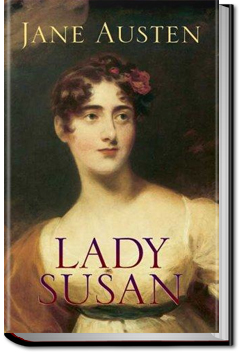Jane Austen demonstrated her mastery of the epistolary novel genre in Lady Susan. Although the primary focus of this short novel is the selfish behavior of Lady Susan as she engages in affairs and searches for suitable husbands for herself and her young daughter, the actual action shares its importance with Austen’s manipulation of her characters’ behavior by means of their reactions to the letters that they receive. The heroine adds additional interest by altering the tone of her own letters based on the recipient of the letter. Thus, the character of Lady Susan is developed through many branches as Austen suggests complications of identity and the way in which that identity is based on interaction rather than on solitary constructions of personality. Lady Susan’s character is also built by the descriptions of the other letter-writers; but even though their opinions of this heroine coincide with the image that develops from her own letters, Austen demonstrates the subjectivity of the opinions by presenting them – primarily – in the letters of one woman to another, thereby suggesting the established literary motifs of feminine gossip and jealousy. Readers recognize these subjective motifs and examine all of the idiosyncrasies of the characters in order to create their own opinion of Lady Susan – as they would of any real acquaintance. (Summary from Wikipedia)
ford, such as he received from a gentleman who knew
her perfectly well, which, if true, must raise abhorrence against her,
and which Reginald himself was entirely disposed to credit. His opinion
of her, I am sure, was as low as of any woman in England; and when he
first came it was evident that he considered her as one entitled neither
to delicacy nor respect, and that he felt she would be delighted with
the attentions of any man inclined to flirt with her. Her behaviour, I
confess, has been calculated to do away with such an idea; I have
not detected the smallest impropriety in it—nothing of vanity, of
pretension, of levity; and she is altogether so attractive that I should
not wonder at his being delighted with her, had he known nothing of her
previous to this personal acquaintance; but, against reason, against
conviction, to be so well pleased with her, as I am sure he is, does
really astonish me. His admiration was at first very strong, but no more
than was natural, and I did not wonder at his being much struck by the
gentleness and delicacy of her manners; but when he has mentioned her of
late it has been in terms of more extraordinary praise; and yesterday he
actually said that he could not be surprised at any effect produced
on the heart of man by such loveliness and such abilities; and when I
lamented, in reply, the badness of her disposition, he observed that
whatever might have been her errors they were to be imputed to her
neglected education and early marriage, and that she was altogether a
wonderful woman. This tendency to excuse her conduct or to forget it, in
the warmth of admiration, vexes me; and if I did not know that Reginald
is too much at home at Churchhill to need an invitation for lengthening
his visit, I should regret Mr. Vernon's giving him any. Lady Susan's
intentions are of course those of absolute coquetry, or a desire
of universal admiration; I cannot for a moment imagine that she has
anything more serio



Embarrassing, I know.
Swear to god, my first thought was, isn't that what they did to me when kid #1 was born? Then, no. wait. that was an episiotomy. Bless.
Alright, since I know I can't possibly be the only person in the world who didn't know the defini